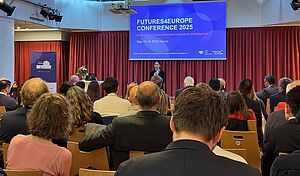Imagining, Designing, Transforming – this was the motto of the Futures4Europe Conference 2025 held in Vienna last week. With several thematic tracks and over 300 participants from more than 30 countries, it was the largest gathering of the European foresight community to date. Organised by the AIT Austrian Institute of Technology, the event provided a platform for intensive exchange on the application of collective intelligence in politics, education, art, culture and technology.
Spotlight on Collective Intelligence and Future-Making
The conference focused on how collective intelligence can be strategically leveraged across various societal domains. Key topics included:
- the use of artificial intelligence in foresight and its potential for creating shared meaning,
- new participatory approaches to engage young people in future thinking,
- designing educational systems that thrive in complexity,
- inspiring case studies from Estonia and the UK demonstrating how foresight and collective intelligence support preparedness for global risks,
- and artistic and experimental methods that make futures tangible and inclusive.
Highlights and Key Impulses
A standout moment was the powerful keynote by Joe Ravetz, who proclaimed: “The best way to forecast is to design the future.” His address was a call to action for embracing Foresight 3.0 to confront the existential challenges of our time.
Hands-on workshops led by Jonathan Blanchard Smith and Wenzel Mehnert equipped participants with practical tools for future-oriented transformation.
In a compelling presentation, Katharina Jäger and Theresa Bürscher showcased their “Empirical Agent-Based Model for Regional Twin Transition Pathways,” illustrating the added value of combining modelling with foresight.
FEN Annual Meeting: A Space for Reflection
Another major highlight was the Foresight Europe Network (FEN) Annual Meeting, moderated by Lena Tünkers and Thays Prado, which provided room for deep reflection on the development of foresight cultures across Europe – a crucial step towards sustainable strategies in research, policymaking, and society.
Download Book of Abstracts



